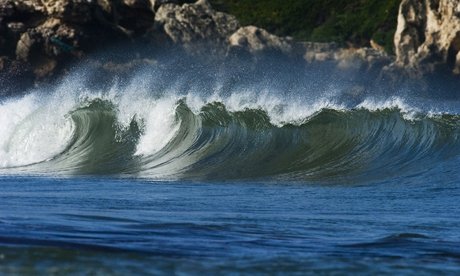Deep Reading: Moby Dick Chapter 1 "Loomings"

If they but knew it, almost all men in their degree, some time or other, cherish very nearly the same feelings toward the ocean with me.
This is Ishmael musing about the wanderlust that drives him toward the sea. I was ready to disagree with him until I kept reading. My first thought was that I am not much of a fan of the sea. The closest I ever got to leaving shore was when I was 13 years old, the summer between my 7th and 8th grade years. I visited my uncle, who was in the navy, in Pensacola, FL. We were supposed to go deep sea fishing on a boat belonging to a friend of his. We had met this man in the gym a few days prior and he told us to make sure to pick up some Dramamine. The idea of sea sickness really turned me off of the whole excursion; that and the ungodly hour we would need to depart. This was my summer vacation. I didn't want to wake up before the sun. So I backed out the night before.
Since then, I have developed a more refined aversion to large bodies of water. The most common reason to go out in the ocean now that I am an adult is the cruise. Cruise ships seem to me to be, at best, havens for disease, and at worst, floating coffins. I have paranoid fantasies of falling overboard and the such. The way I see it, the ocean is a giant buffet full of creatures that kill with their face. And when you enter the ocean, you're on the menu. Ishmael explains in this chapter why he would never go on a boat as a passenger.
I do not mean to have it inferred that I ever go to sea as a passenger. For to go as a passenger you must needs have a purse, and a purse is but a rag unless you have something in it. Besides, passengers get sea-sick-- grow quarrelsome-- don't sleep of nights--do not enjoy themselves much, as a general thing;--no, I never go as a passenger...
So while I thought that I do not cherish the water the way Ishmael describes, I could relate to his restlessness with being tied to a square job and all the normal trappings of society. There's this vague feeling that I am waiting for life to start; that I'll finally be happy when [x] happens. This is an illusion, of course. Life is happening right now constantly. And you only achieve the happiness you create.
It wasn't until this line that I realized the point he was trying to make about the water:
Were Niagara but a cataract of sand, would you travel your thousand miles to see it? Why did the poor poet of Tennessee, upon suddenly receiving two handfuls of silver, deliberate whether to buy him a coat, which he sadly needed, or invest his money in a pedestrian trip to Rockaway Beach?
I misunderstood him in the beginning. There is an attractiveness to the water. Though I don't share his compulsion to embark, I do enjoy the beauty seascapes have to offer. I love the beach and seafood. I grew up near a coast, so I didn't grasp how much I liked these things until I spent three years landlocked. I live near the water again and I can't see wanting to go away.
Ishmael seems to realize he is a character in a story, or he sees himself that way. He gives up the idea of free will early on, believing he is under control of "The Fates". The whaling voyage is unglamorous and he is just fine with that. His curiosity of the creature more than makes up for whatever perceived indignities he may endure as a sailor aboard this shabby boat.